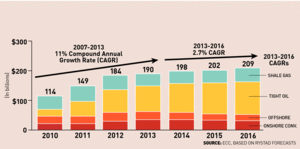
The ongoing shale-gas-induced transformation of U.S. energy production will continue to drive increasing levels of capital expenditures (capex) for the foreseeable future, said industry officials speaking at the Engineering and Construction Contracting Association's (ECCA) annual convention, held on Sept. 3-6 in Orlando. The ECCA comprises owners, contractors and engineers involved in the energy production sector.
But the growth in capex is definitely slowing, according to Jorge Leis, an oil-and-gas industry consultant who moderated a panel discussion, "Perspectives on the Market From the Energy and Process Industries." From 2007-2013, for instance, investment related to oil and gas exploration and development averaged an annual growth rate of 11%. However, for the period of 2013 through 2016, the group expects annual growth of about 2.7%. For 2014, Leis cited estimates showing overall U.S. oil-and-gas industry investment totaling $198 billion, or double that invested in 2007.
Much of that future investment will likely relate to natural-gas production, which has been boosted by the ongoing boom in shale gas and is now among the largest contributors to the nation's total natural-gas production. Overall, Leis noted, industry forecasts are nearly unanimous in predicting continued increases in natural-gas production. On the other hand, forecasts vary significantly with regard to when domestic oil production will peak, with some predictions indicating declines will begin as early as 2016.
While the overall capex growth rate is slowing, investments in the energy- related chemical industry could double in 2014-2016, to a total of $16 billion.
Achieving these infrastructure investments may prove challenging due to a shortage of skilled workers and resources. Conference attendees were asked whether the "resource gap" is a long-term issue and whether the labor market will "self-correct." In response, 78% of owners and two-thirds of contractors and suppliers viewed the shortage as a long-term issue requiring industry action.
"Availability of qualified resources is certainly going to be a challenge," said Tina Faraca, vice president of engineering and construction with Spectra Energy, a pipeline and infrastructure developer.
Citing historically high starting salaries for college graduates, however, she noted, "This is an unprecedented time for us to attract the talent that we really need."




Post a comment to this article
Report Abusive Comment